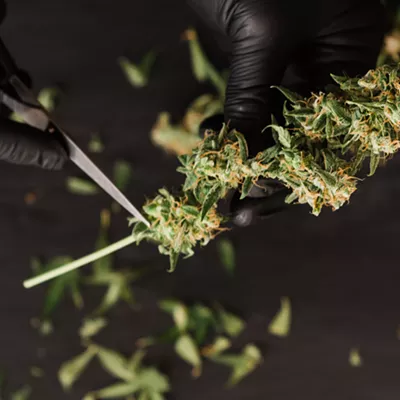When medical marijuana was legalized in Florida, the ever-curious Roz Smith-McCarthy decided to study it.
Her interest in cannabis was piqued when medical marijuana was legalized in her state.
“It gave me the kick in the pants to learn more about cannabis from a medical perspective and understand more about what that means for patients — specifically patients who are low-income people of color,” she said.
“My son has sickle cell anemia, which is a genetic disorder that occurs predominantly in African American children.”
She did something about it. She founded Florida-based Minorities for Medical Marijuana and Black Buddha Cannabis.
Black Buddha CannabisSickle cell disease causes a variety of painful symptoms, including headaches, swollen joints, vision problems and frequent infections. The episodes of pain are so severe that they require hospitalization.
Sickle cell has no cure. The Centers for Disease Control and Prevention estimates that 90% of SCD cases occur in Black people.
“There were conversations about around how cannabis can support sickle cell patients, and for me, it was almost like a light went off — thinking that this could be an option for my son when he's old enough to consume,” she said.
“This could be something that keeps him out of the hospital and off of Dilaudid, morphine and other opioids.”
To complement Black Buddha Cannabis, she started Minorities for Medical Marijuana, a nonprofit that works to advocate for BiPOC communities impacted by the War on Drugs.
“(M4MM) is a nonprofit organization focused on communities of color,” she said.
“We work on social justice issues, health equity issues, issues around social equity, operator-like ownership and being able to become an operator in the industry as well as public policy.”
“M4MM essentially does it all, ranging from action such as the expungement of cannabis records or providing general education on the health benefits of cannabis. But at the organization’s core, is a desire to advocate for cannabis reform, both politically and culturally. M4MM currently has 27 chapters across the United States, Arizona included. M4MM also has chapters internationally — ranging from Canada to Jamaica.”
Though Smith-McCarthy was dedicated to fostering a sense of advocacy in the cannabis industry, she had not consumed cannabis herself. In 2021, she suffered a traumatic brain injury from a car crash. She turned to cannabis to encourage healing.
“The cannabis industry can be a lonely industry sometimes,” she said.
“You're talking about something that's federally illegal. You're talking about families that sometimes when you're like, ‘Yeah, I'm in cannabis (business),’” she said.
“They're like, ‘Oh my God, don't tell me anymore.’ And I felt lonely doing what I'm doing. My advocacy turned into my own personal story.”
Smith-McCarthy struggled with painful headaches and light sensitivity. She frequently passed out as well. She began using a combination of high CBD products with THC. She finally felt “normal.”
“It was that moment that I was like, ‘My gosh, I feel so much better,’” Smith-McCarthy said.
“When you have a traumatic brain injury, what ends up happening is it feels like you have this pressure inside your head. You can’t think, you can’t function. And it’s not like a migraine, the whole entire head feels like a balloon that you just want to pop. And when I would consume cannabis, it would be that little pop that I needed.”
That relief led to the creation of her own brand, Black Buddha.
“It was when I finally got to a point where I said, ‘I'm not OK. I need help,’” she said.
“That’s when, mentally, everything just started coming together. I decided to create this brand that’s about empowering women to embrace cannabis. And now it's empowering people in general to embrace cannabis as an option for your wellness.”
Black Buddha features strains for specific therapeutic benefits and highlights terpene profiles. Smith-McCarthy yearns to educate consumers, which is difficult to find in the cannabis industry. Smith-McCarthy explained that at the crux of the stigma against cannabis is a lack of education.
“Our biggest opportunity is to continue to educate people about the endocannabinoid system that we all have,” Smith-McCarthy said.
The endocannabinoid system, a group of messengers and binding sites in the body, generally helps regulate the immune system, appetite and memory. It’s a biological system that, over the years, has gained significant traction in the cannabis industry because of the way consuming cannabis interacts with the ECS, generally by activating cannabinoid receptors in the ECS.
Smith-McCarthy added she works to dismantle the stigma of cannabis, particularly its label as a gateway drug.
“If we look at the new consumers that are going to come into the market who are a little bit skittish, they're a little bit concerned about getting high,” Smith-McCarthy said.
“They're like, I don't want that, but I need something for my anxiety or I need something to help me sleep at night. You got to give them what they're asking for. And you have to set the expectation of what they're going to get. And so, if you look at our product line, we have everything based on experiences.”
In the Arizona market, there is the “Blyss” line, a hybrid designed to bring a mellow functionality. Then there is the “Dream” line, a soothing indica meant to inspire a peaceful mood and a restful night's sleep.
Beyond an emphasis on healing, Black Buddha is committed to both sustainability and social equity.
“From the bottom of my heart, I believe that this brand will set the pace for what equity and social impacted brands can do and how they can use this as a benchmark in regard to their own individual success, she said.
“My goal is to set the pace, and not only set the pace, but be able to take revenue from what we're able to create and put it back into companies who need resources. Imagine if you're wanting to do something similar in a different state or what have you, and you're like, but I don't know where to begin. We will do Zoom webinars with other different businesses who are socially impacted to help them navigate through how to create your brand.”
Launching a cannabis brand comes with a hefty price tag, along with a complex treasure trove of legalese.
“We have the ability to share our expertise, share our knowledge, and when I make some money, I'm going to share some money that others can also maybe use as a path for their own equity opportunity,” Smith-McCarthy noted.
Sustainability is a key to Black Buddha’s foundation, and Smith-McCarthy aims to implement sustainable packaging practices.
McCarthy continues to advocate for the legalization of adult-use cannabis in her state. Meanwhile, she’s confident in the future of cannabis and its role in benefiting the lives of those struggling with health issues.
“It's an industry that I'm excited about and I just want other folks to give it a shot. Not even give it a shot, but give it a chance to be what it is and not try to make it, something that it's not,” McCarthy said.
Black Buddha is exclusively available in AZ at Trulieve stores












